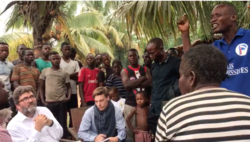Reform Development Finance Institutions’ (DFIs) grievance mechanisms to uphold human rights
In November 2018, leaders from nine communities from the Democratic Republic of Congo (DR Congo) whose land rights and livelihood were affected by the PHC-Feronia large-scale palm oil plantation took a historic step and filed a complaint with the Independent Complaints Mechanism (ICM) jointly operated by the German development finance institution DEG, FMO of the Netherlands and France's Proparco. This grievance mechanism had been in operation since 2014, but the nine communities in the DR Congo are the first to request mediation.
For the plaintiffs, the mediation represented an extra-judicial avenue that would facilitate the resolution of a long-standing land conflict with Plantations et Huileries du Congo (PHC), a palm oil company claiming concession rights to 107,000 hectares in the three provinces in the DR Congo where the communities reside. These concessions in the Equateur, Mongala and Tshopo provinces date back to the colonial era: the communities have disputed their validity throughout PHC's occupation of their ancestral land.
In January 2019, the ICM accepted the complaint and agreed to initiate the mediation process. The mediation requested by the communities and accepted by the ICM is a first of its kind for all the parties involved: the representatives from the nine communities, the development institutions operating the complaint mechanism, and the Expert Panel that was charged with processing the complaint. As such, it is also a test case for the ICM's procedures; it may set a precedent for future complaints submitted to the ICM involving mediation.
The brief document attached was realised by the independent researcher Jutta Kill while she was associated with the University of Bristol. It is based on a long relationship with the territories and the communities, along with a series of community workshops and meetings before the outbreak of Covid. The aim was to collect the voices and experiences of the community members with regard to the reactions of the company after the mediation was launched, their interactions with the ICM and how the financing institutions engaged since the complaint was filed.
The research demonstrates that the financial support provided by the DFIs to the investor has not guaranteed a fair and just dispute resolution process. In addition, it has also not protected community members from escalating levels of violence perpetrated by PHC security. The community members at the Lokutu plantation site in the province of Tshopo registered their disappointment with the DFI’s approach to the mediation and the wholly inadequate development bank response to escalating violence perpetrated by PHC security. In particular, the community members stressed that since the complaint was filed in November 2018, the violence had left three villagers dead, and more than 25 people have been arrested. Six villagers were, as of July 2021, still being held in jail without charge, months after their arbitrary arrests.
Overall, the complainants have been confronted with inadequate institutional support from the ICM. The ICM expects complainants to be self-funded or rely on northern NGOs and civil society organisations for financial support. Moreover, the ICM does not seem to have provided materials and adequate exchange opportunities that could help complainants prepare for mediation or find out about community experiences with mediating legacy land conflicts elsewhere. In combination with a lack of adequate procedures, including procedures that clearly describe the formal role, if any, of northern NGOs and civil society organisations, the mechanism as currently designed can easily reinforce unequal power relations both between complainants and the company and between complainants and northern civil society organisations.
The research, the document and the policy brief aim is to raise awareness of what has gone wrong in this first-ever mediation process under the ICM so that other communities will be in a better position to face inadequate support from the ICM and the development institutions. The process to date has revealed an extremely uneven playing field that complainants did not expect, considering the ICM is a dispute resolution mechanism operated by public institutions with a development mandate and commitment to upholding human rights. However, the main point is that a mediation process structured like the ICM is unlikely to address long-lasting tensions and tenure issues that arise when ‘development’ projects on public lands take over large tracts of ancestral land. As it stands, the ICM mediation process that followed the community complaint from the DR Congo may, in the best-case scenario, divert attention from the underlying land issue and generate a sense of frustration and impotence among the local communities. In the worst case, the impossibility of the mediation to effectively address the root causes of the problem can intensify existing tensions and give rise to new conflicts.














